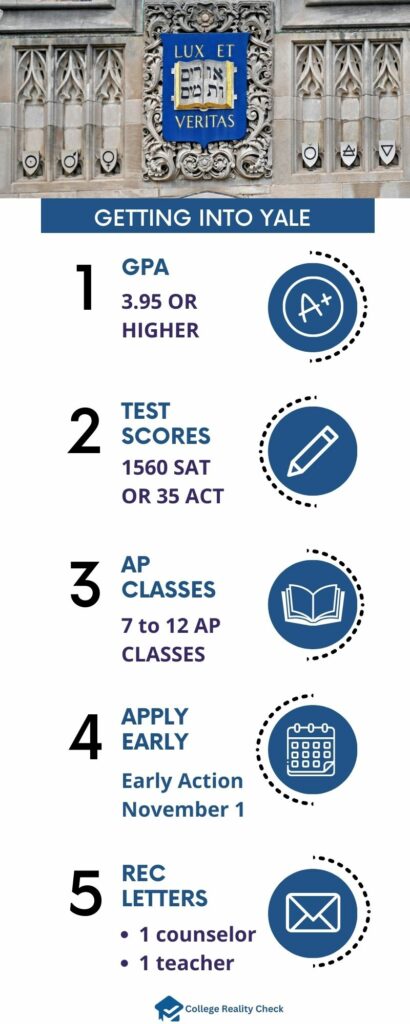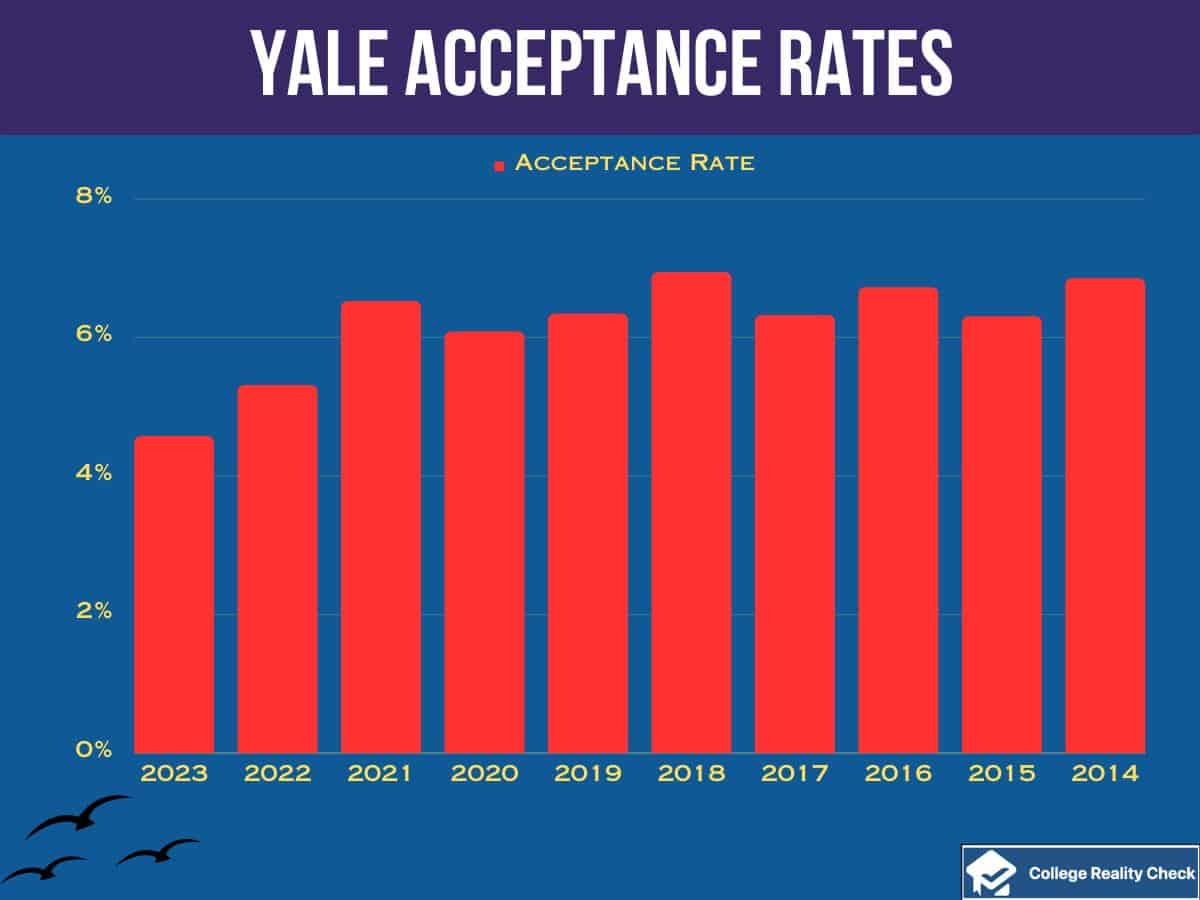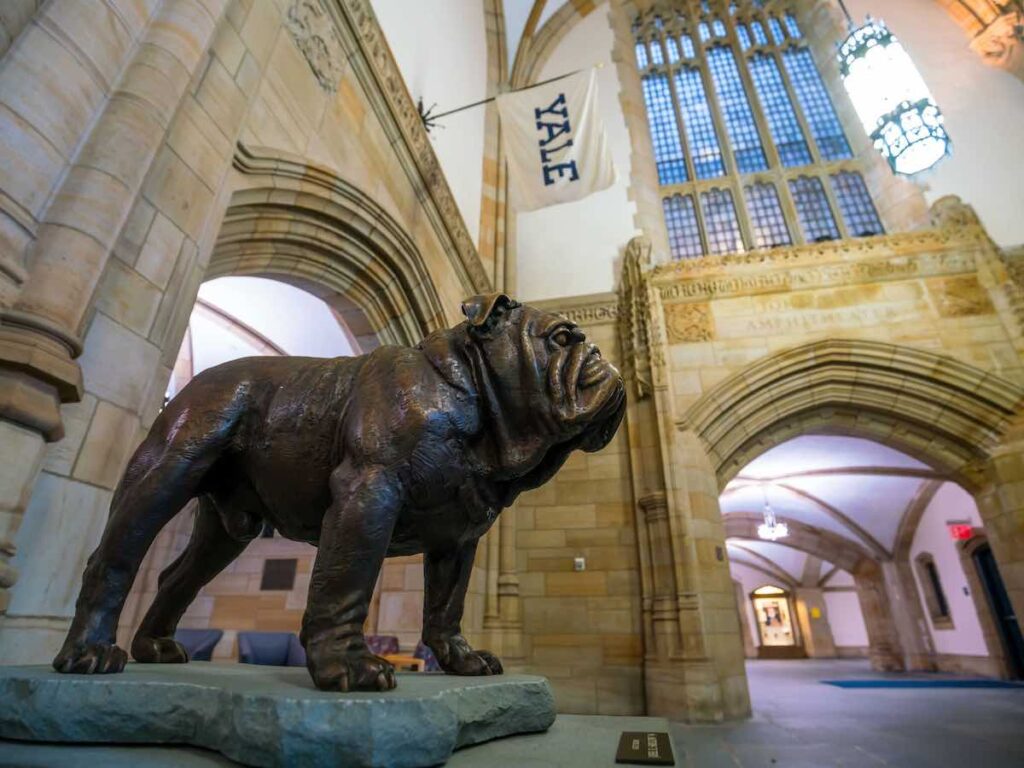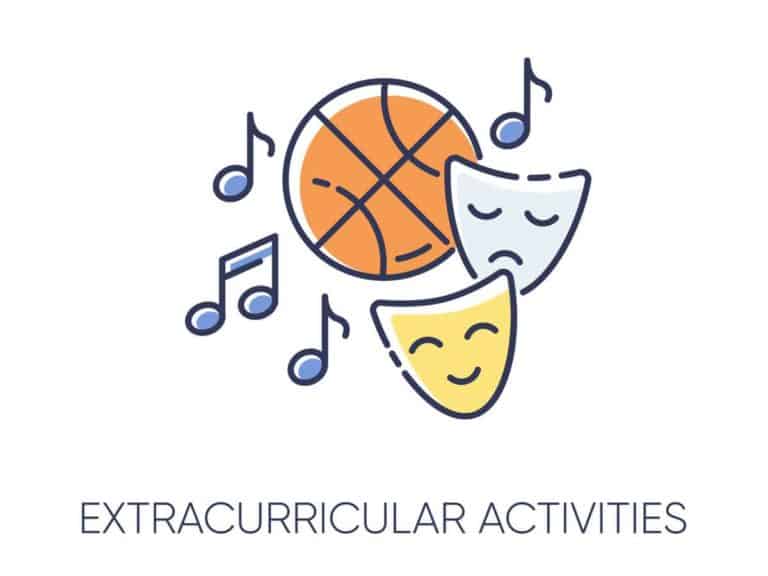Crack the Yale Code: 11 Expert Insights on Mastering the Admission Journey
Many love the idea of being a Yalie — a Yale University student.
However, many also hate that up to 95% of hopefuls do not become one.
With a very low acceptance rate of 5%, it’s no wonder that many college-bound teens scour the web to learn how to get into Yale and become degree-seeking students at an Ivy League.

You need to take 11 steps to increase your Yale admissions chances:
GPA: The Closer to a 4.0, the Better
Yale does not have any minimum GPA requirement.
College-bound teens of any high school GPA may apply, and their applications will undergo review.
We know two things about Yale:
- It’s an extremely selective institution
- It considers GPA as a very important admissions criterion
Indeed, a high GPA is instrumental to getting into it.
So, how high your GPA should be?
Here’s a problem: its Common Data Set (CDS) neither reveals the GPA ranges of admitted first-time, first-year students nor indicates their average GPA.
Although, it’s safe to assume that a GPA of at least 3.95 is optimal.
Does Yale Prefer a Weighted or an Unweighted GPA?
Admissions officers do not prefer weighted GPAs over unweighted GPAs or vice versa.
What Yale looks for is that applicants have challenged themselves with the strongest curriculum available at their respective high schools — more about this essential matter shortly.
Graduate With a High Rank
Yale definitely wants students who graduate with honors.
Two things that confirm this:
- Its CDS says that class rank’s role in the admissions process is “very important”
- Up to 99% of its admitted freshmen students graduated in the top 25% of their class
Do you want to increase your chances of getting in?
Then graduate in the top 10% of your high school class — 97% of its incoming class did so.
What If My High School Doesn’t Rank?
Your counselor or high school official should leave the class rank space on your school report blank.
Admissions officers at Yale College review applications holistically. You will not be at a disadvantage in the admissions process if your high school does not use a ranking system.
Take AP Classes — Up to a Dozen, If You Can
Remember when I said that Yale wants teens who like challenging themselves academically?
Here’s when the importance of registering for AP classes comes in.
Yale does not have specific requirements when it comes to AP classes.
However, this is the consensus among college admissions pros:
- Taking 4 to 8 AP classes is okay for most colleges
- Taking 7 to 12 AP classes is ideal for selective colleges
But don’t just take any AP classes throughout your high school career — remember to add some of the most challenging AP classes to the ones you’re interested in, regardless of the difficulty level.
Consider taking AP courses in the following list:
- AP Art History
- AP Calculus AB
- AP Calculus BC
- AP Chinese Language and Culture
- AP English Language and Composition
- AP English Literature and Composition
- AP French Language and Culture
- AP German Language and Culture
- AP Italian Language and Culture
- AP Japanese Language and Culture
- AP Latin
- AP Music Theory
- AP Physics C: Electricity and Magnetism
- AP Physics C: Mechanics
- AP Spanish Language and Culture
These are some of the hardest AP classes out there, and their corresponding AP exams are the ones that can earn you college credit if you score a 5 in them.
Can I Get Into Yale Without AP Classes?
According to Yale, it understands that students did not design their high school’s curriculum, which is why it expects applicants to have taken AP classes only if their high schools offer them.
It expects students to shine only in whatever academic opportunities are available to them.

Have Some Meaningful Extracurriculars
Yale considers various non-academic criteria in the admissions process.
Besides talent and character, extracurricular activities are some of those that matter the most.
Here’s something to know about EA’s role in your application: Yale is less concerned with the number of your extracurriculars throughout your high school career than your participation’s quality.
So, in other words, it prefers quality over quantity.
Partaking in EAs that you find engaging is fine.
However, since the goal is to get into one of the most selective postsecondary institutions, participate in those that align with your academic and career goals.
It’s also wonderful to choose extracurriculars that build leadership skills.
Will Yale Verify My Extracurriculars?
Yale’s undergraduate admissions office assigns staff members to perform random audits of information applicants and admitted students provide, and extracurriculars are some of those they check.
Be honest when enumerating EAs in your Common App or Coalition App!
Give Back and Volunteer
An integral component of the education of Yale students is public service.
Thousands of its students spend many hours serving both local and global communities — one of the many giving-back programs it has is the President’s Public Service Fellowship.
Yale wants students who demonstrate the potential of becoming leaders long after graduation.
By doing community service and volunteer work, you show your commitment to inspiring positive changes in people’s lives, a testament that you would make the perfect addition to the Yale campus.
What Kinds of Volunteer Work Does Yale Like?
Yale does not prefer one type of volunteer work over another — it just wants students who help people in their respective communities, doing the best they can in their selfless ways.
However, it’s best to spend volunteer hours in activities that align with your passion and career goals.
Submit Your SAT or ACT Scores (If You Have Them)
Yale is test-optional.
It’s up to the applicants to decide whether or not they will submit test scores.
According to Yale, those who took the SAT or ACT once or multiple times should consider reporting their scores even if they are below the composite score ranges of admitted first-year students.
Here’s what their standardized testing profile looks like:
| Test Score | 25th Percentile | 50th Percentile | 75th Percentile |
|---|---|---|---|
| SAT composite | 1470 | 1540 | 1560 |
| ACT composite | 33 | 35 | 35 |
To substantially increase your chances of getting into Yale, share the same score with or outscore the top 25% of test takers: 1560 or higher on the SAT or 35 or higher on the ACT.
Please note that Yale does not make admissions decisions based solely on test scores.
Its admissions officers evaluate submitted SAT and ACT scores within each applicant’s unique context. They also sometimes use them to augment other academic indicators that could use some help.
Should I Submit All Test Scores to Yale?
Yale super scores test scores, although slightly differently between the SAT and ACT.
Admissions officers focus on the highest individual SAT section scores and consider only them. Then, they focus on the highest ACT composite score across various test dates while checking out individual ACT subscores.

Yale Recommends Getting the Right Recommenders
Having holistic admissions, it makes sense that Yale considers additional insights into an applicant’s academic achievements, values, character, and contributions to the classroom and campus community.
That’s why it requires one counselor recommendation and two teacher recommendations.
Are you from a large high school?
Are you worried that your counselor does not know you that well?
Worry not — the recommendation may still provide Yale’s admissions officers with contextual information about your high school and its academic and extracurricular programs.
On the other hand, the two teacher recommendations should come from those who taught you core academic subjects such as English, mathematics, science, and social studies.
Although not required, teacher recommendations from your junior or senior year of high school are preferable.
Can I Submit an Additional Letter of Recommendation?
Yale does not require or encourage the submission of a supplemental recommendation.
However, some academic programs welcome optional recommendations — for example, engineering applicants who did related research may submit a recommendation from their mentors.

Write All Essays and Short-Answer Questions Contemplatively
Are you applying to Yale (or any other college) through the Common App or Coalition App?
You must write an outstanding college essay, also known as a personal statement.
Besides that, Yale also requires you to answer one school-specific essay using 400 words or fewer.
Your choices are all about reflecting on:
- A discussion of an important issue with someone with an opposing view
- Your membership in a community that you find meaningful
- How an experience has shaped you and will enrich your college experience
There are also three short-answer questions to take care of — with your answers limited to 125 words or fewer and 200 words or fewer, you cannot hide behind fluff and jargon and must go straight to the point.
What Should I Talk About in My College Essay?
Yale agrees that applicants cannot talk about their entire life using a limited number of words.
As such, it recommends picking topics that can give its admissions officers an idea of who you are. It adds that you should discuss things you care about and do so thoughtfully and reflectively.
Wait for an Invitation for an Interview and Grab It
Around 5,000 alumni members volunteer each year to interview Yale applicants.
According to a Quora responder, around 60% of all first-time, first-year applicants get an invitation for an interview, although it will depend on the number of available interviewers.
Yale says that an interview is not a requirement in the admissions process.
However, its CDS report indicates that it’s a consideration.
That’s understandable since admissions officers prioritize interviewing applicants from whom they need more information, perhaps to be able to put the things they said in their applications into context.
Yale makes it clear that you will not be disadvantaged if you do not receive an invitation for an interview.
However, it does not say whether declining an interview (probably without a valid reason) can harm your application — it just states that invited applicants should reply to the interviewer.
May I Ask Yale to Schedule Me for an Interview?
According to Yale, prospective students may not call or email to ask for an interview. Contacting the Undergraduate Admissions or the local Alumni Schools Committee (ASC) to request one is a definite no-no.
Similarly, they may not schedule an interview while taking a campus tour during the application process.

Submit a Competitive Application Early
At Yale, the deadline for the regular decision plan is January 2.
Applying earlier than everybody else is a great idea if Yale is your top-choice institution, and you can write your essays and obtain various admissions requirements in no time.
There’s no early decision plan available.
Instead, you may apply via single-choice early action, also known as restrictive early action.
While single-choice early action is non-binding (you are not obliged to enroll if Yale accepts you), it restricts you from applying to other schools through any early admission plan (early decision and early action).
Yale’s single-choice early action deadline is November 1.
Historically, the acceptance rate among early applicants has been higher than regular decision applicants.
However, Yale clarifies that it’s due to many strong candidates applying early.
If you want to leverage a small application pool and demonstration of interest to your advantage to increase your chances of getting into Yale, ensure that your college application is competitive.
Can I Reapply If Denied Admission Under Single-Choice Early Action?
You cannot apply to Yale via the regular decision round if it rejects your single-choice early action application. You can apply to Yale or any other institution only once per admissions cycle.
If deferred, your application will undergo review again during the regular decision round.
Send Yale a Letter of Continued Interest
As a regular decision applicant, you can hear back from Yale’s admissions office in three ways:
- An acceptance letter
- A rejection letter
- A waitlisted letter
You may send Yale a continued interest letter if you are interested in attending it after being put on the waitlist.
This letter should highlight any new academic and personal interests you accomplished since being waitlisted. It can be anything from a higher test score, additional community service, or a related internship.
Are My Chances of Getting Accepted From the Waitlist High?
Unfortunately, less than 1% of waitlisted students get accepted — 0.9%, to be exact.
While many waitlisted inform Yale University of their continued interest in attending (around 78% of them send a letter), it’s wise to consider your other options while waiting for an admissions decision.
Read Next: How to Get into Dartmouth
Disclaimer: The views and opinions expressed in this article are those of the authors and do not necessarily represent those of the College Reality Check.






